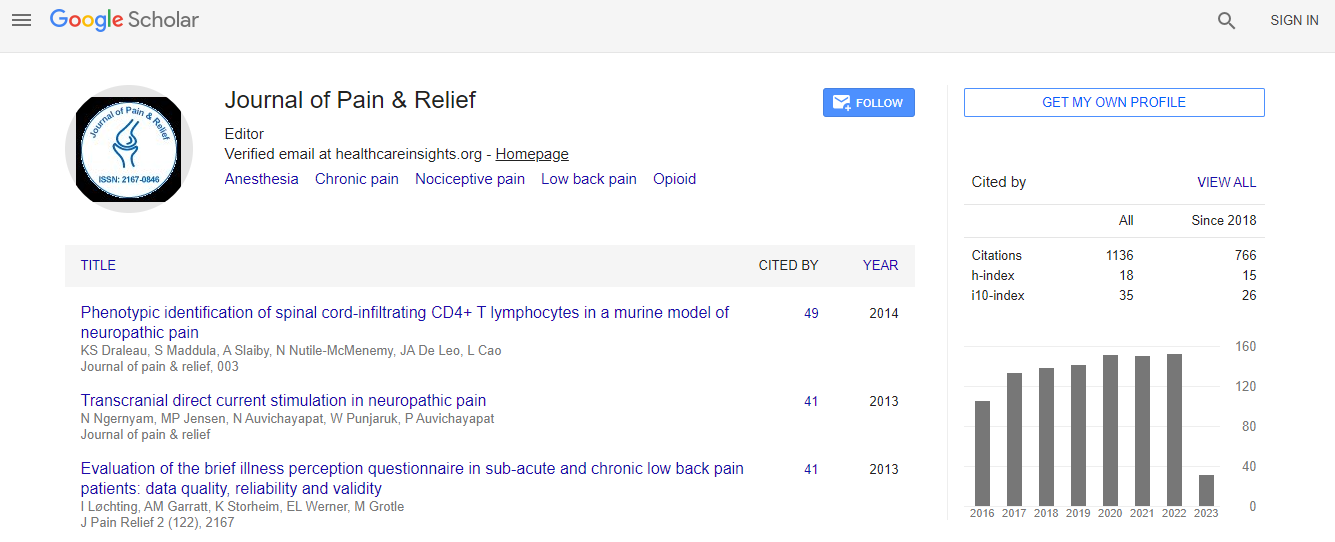Our Group organises 3000+ Global Conferenceseries Events every year across USA, Europe & Asia with support from 1000 more scientific Societies and Publishes 700+ Open Access Journals which contains over 50000 eminent personalities, reputed scientists as editorial board members.
Open Access Journals gaining more Readers and Citations
700 Journals and 15,000,000 Readers Each Journal is getting 25,000+ Readers
Recommended Conferences
42nd Global Conference on Nursing Care & Patient Safety
Toronto, CanadaGoogle Scholar citation report
Citations : 1556
Journal of Pain & Relief received 1556 citations as per Google Scholar report
Journal of Pain & Relief peer review process verified at publons
Indexed In
- Index Copernicus
- Google Scholar
- Open J Gate
- Genamics JournalSeek
- Cosmos IF
- RefSeek
- Hamdard University
- EBSCO A-Z
- OCLC- WorldCat
- Publons
- Geneva Foundation for Medical Education and Research
- Euro Pub
- ICMJE
Useful Links
Recommended Journals
Related Subjects
Share This Page
Current status of intrathecal therapy for cancer pain
International Conference on Pain Research & Management
Hossam El Beheiry
University of Toronto, Canada
Keynote: J Pain Relief
Abstract
It is estimated that each year in Ontario, Canada more than 1,600 cancer patients experience refractory pain at the end of life, even when they are given maximal opioid and non-opioid pain therapy. Intrathecal drug delivery systems may be used to manage such refractory or persistent cancer pain. Nonetheless, there is no definitive evidence that intrathecal treatment of refractory cancer-related pain is superior to other modalities. In this abstract we investigated and reviewed the benefits, harms and cost-effectiveness of intrathecal therapy compared with current standards of care for adult patients with chronic cancer pain. Current evidence could not establish the benefit, harm, or cost-effectiveness of intrathecal drug delivery systems compared with current standards of care for managing refractory cancer pain in adults. Moreover, the optimal timing of implantation, selection of intrathecal medication and specific strategies for dosing and administration has not been well defined. The available evidence showed that patients may have fewer drug side effects with intrathecal drug delivery systems, but they did not have less pain. We also found that routine pain management costs less than intrathecal drug delivery systems, unless the patient uses the system for 7 months or more. The latter is an important notion, since the increase in cancer survivorship will prompt the need for long-term management strategy for chronic cancer pain rather than the existing short-term palliative care approach.Biography
Hossam El Beheiry has obtained his Anesthesia FRCPC Specialty Certificate in Anesthesia in the year 1994. In 1990, he completed his PhD from the Department of Pharmacology and Therapeutics, the University of British Columbia, Canada. He has also spent a year as a Fellow in Clinical Pharmacology at the University of British Columbia. He is a trained Neuroanesthesiologist at the University of Toronto, Toronto, Ontario, Canada. He has authored many publications in Opioid Pharmacology and Regional Anesthesia including complications of regional nerve blocks. Hossam.El-

 Spanish
Spanish  Chinese
Chinese  Russian
Russian  German
German  French
French  Japanese
Japanese  Portuguese
Portuguese  Hindi
Hindi 
